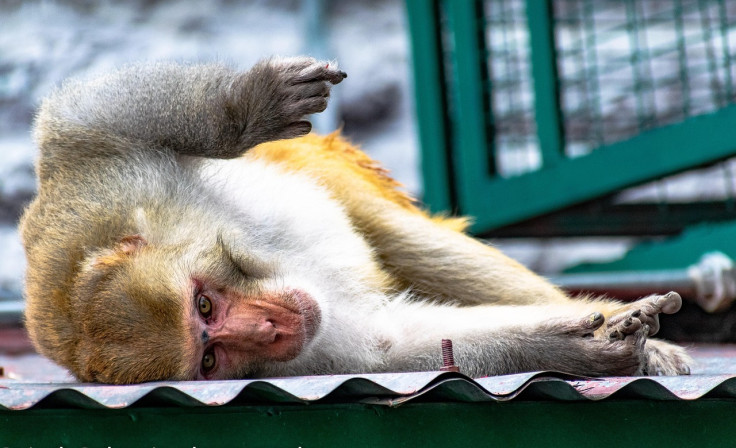Wild Monkeys Loose In Mississippi: Here's What You Should Do When You Spot One
A truck carrying rhesus monkeys overturned on I-59 near Heidelberg, releasing several animals into nearby woods

A public safety alert has been issued in Mississippi after a lorry carrying rhesus monkeys overturned on Interstate 59 near Heidelberg, releasing several of the animals into surrounding woodland.
Local authorities said the primates, each weighing about 18 kilograms, were considered 'aggressive' and warned residents not to approach them. Officials initially claimed the monkeys could carry diseases including hepatitis C, herpes and COVID-19.
However, Tulane University later stated the animals belonged to another facility and had not been exposed to any infectious agents. The incident has raised wider concerns about wildlife containment, public health, and the transport of research animals.
'The primates in question were not carrying any diseases and had received recent checkups confirming that they were pathogen-free. Although Tulane did not transport or own the nonhuman primates at the time of the incident, we sent a team of animal care experts to assist in this tragic incident,' the statement said.
What Happened
The crash occurred on 28 October 2025 when a transport lorry overturned near mile marker 117 on the interstate. Several monkeys escaped from their enclosures and fled into nearby forest. The Jasper County Sheriff's Department said most were later recaptured or humanely destroyed, but one remains unaccounted for, according to The Guardian.
Officials urged anyone who spots the animal to keep a safe distance and call emergency services. 'If you see the monkey, do not approach it. Call 911,' the department posted on social media. The combination of escaped wildlife and possible disease exposure has prompted a coordinated response from local health and environmental agencies.
Tulane's statement that the monkeys were not infected eased some public concern, though residents remain uneasy about safety and containment while the search continues.
Are Residents in Danger?
Experts say that while the risk of widespread infection appears low, direct contact could pose health hazards. Rhesus monkeys can carry zoonotic diseases, infections transmissible between animals and humans, such as the herpes B virus and certain forms of hepatitis, according to the New York Post. Even when infection risk is uncertain, medical professionals advise anyone bitten or scratched to seek urgent care.
Monkey bites can cause deep wounds and secondary infections. Health officials advise washing the area thoroughly with soap and water, covering it, and informing a doctor that the injury came from a non-human primate. Rabies is rare in rhesus monkeys, but medical professionals recommend that any animal bite be assessed for possible exposure.
People should also watch for symptoms such as fever, rash or swelling and report them promptly to healthcare providers.
JUST IN: A truck hauling rhesus monkeys from Tulane University crashed on I-59 in Jasper County, MS.
— Mallory Smith (@mallorysmithtv) October 28, 2025
The monkeys are about 40 lbs each, aggressive, and may carry hepatitis C, herpes, and COVID.
All but one have died. Officials say if the remaining monkey leaves the wreck site,… pic.twitter.com/y66G25XZq8
Officials continue to search for a Rhesus monkey that remains loose after a semi-truck crash during transport to a testing facility. The monkey was reportedly exposed to COVID-19, Hepatitis C, and Herpes, and should not be approached.
— Bojankins (@Brojankins) October 29, 2025
The animal is one of several that escaped… pic.twitter.com/U1W9ye4vZZ
basically stay tf outta mississippi dey purposely infected those monkeys & wreckd so dey cud escape https://t.co/lHXscLkgid
— iAintShit💩 (@AintShitNiggah) October 29, 2025
What Residents Should Do
Authorities have advised residents in the Heidelberg area to stay alert until the final monkey is found. Locals are urged to avoid wooded areas near the crash site and remain in vehicles if the animal is seen. Pets and children should be kept indoors, and those travelling along rural roads are encouraged to stay vigilant.
Local wildlife teams and public health officials continue their joint search, with updates shared through official channels and local news outlets.
Continuing Search
What began as a road accident has developed into a wider public-health and wildlife-safety issue. While experts say the risk of infection appears low, the incident has highlighted weaknesses in the transport of laboratory animals and how quickly misinformation can spread during emergencies.
Officials continue to urge residents not to approach unfamiliar wildlife and to report any sightings immediately. The search for the remaining rhesus monkey is ongoing, and authorities say further updates will be issued once it is located.
© Copyright IBTimes 2025. All rights reserved.





















